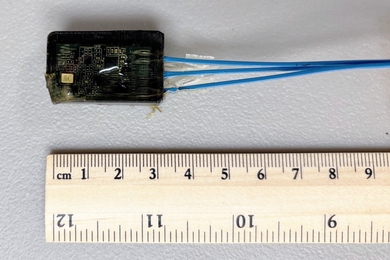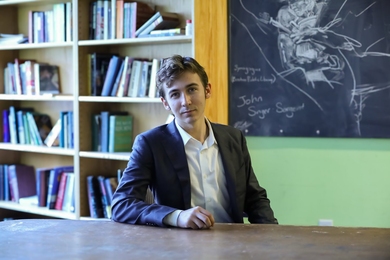In our “Reporter’s Notebook” series, we feature first-person accounts of News Office writers on life at the Institute.
Padma Lakshmi, actress and host of the popular television program “Top Chef,” admits that it feels a little odd to talk about her period in front of an audience of total strangers. But she has realized that sharing her own history with endometriosis, a disease caused when scar tissue builds up outside the uterus, could help others who suffer from the disease.
“I don’t want other girls to just sit there smiling silently like nothing is wrong,” Lakshmi said Friday at the launch of MIT’s new Center for Gynepathology, which will bring together engineers, scientists and physicians to study endometriosis. Sporting a black dress that showed off her baby bump, Lakshmi had the mostly female audience in a Stata Center auditorium captivated with her story.
Like many who suffer from endometriosis, including MIT Professor Linda Griffith, director of the new MIT center, Lakshmi endured the pain for years before being diagnosed. Doctors told her that she was overly sensitive, or exaggerating her symptoms. Some thought her pain might be due to scoliosis, others said it might be because “you’re Indian and you eat really spicy food.”
Lakshmi’s teenage years were filled with missed school dances and failed exams, all because she had to spend several days in bed every time she had her period. “My mother prepared me for it because she had it, too. She told me it was just our lot in life,” Lakshmi said.
Working as a model and actress in her 20s and 30s, the disease kept Lakshmi in its grip, while doctors kept telling her nothing was wrong. She tried hard to pretend that nothing was wrong, and to keep up the frenetic pace of her life. But she had to make accommodations. “Everything I scheduled in my life, I always had to look at the calendar and say, ‘Am I having my period that week?’” If so, the calendar stayed empty.
Lakshmi, who recently turned 39, soldiered on until one day three years ago, when she experienced some unexpected and heavy bleeding during a photo shoot. Her doctor told her to go to a specialist, laparoscopic surgeon Tamer Seckin.
On the day of her appointment, Lakshmi was in a hurry because she was supposed to go to a fashion dinner that night. After her exam, she was e-mailing on her BlackBerry while waiting for Seckin to come in with the results. When he did, he asked her to turn her BlackBerry off — a sign, she felt, that he had bad news. He told her she had endometriosis and that “if we don’t take care of it, you will lose the ability to become a mother.” He told her that she had sublimated the pain so much she didn’t even know how much pain she was in.
For Lakshmi, it was a breakthrough. “For the first time, somebody in the medical field wasn’t telling me that I was sensitive, or emotional, or overdramatic. For the first time, someone finally said, ‘You have a problem, and if you don’t do something about it, you will not be well.’”
Three surgeries later, Lakshmi can’t believe the difference in her life, in terms of her mood and productivity. “It’s like night and day,” she said. “I treat my employees better … I’m nicer to my mom … This is what life is supposed to be like. Life is not supposed to be filled with pain just because you are a woman.”
To help raise awareness of “the disease that people don’t want to talk about,” Lakshmi and Seckin recently started the Endometriosis Foundation of America. Lakshmi said she also hopes that more researchers will direct their attention to the disease, following MIT’s lead. “I’m very, very moved that somebody finally has been hearing the silent cries and tears of women across the country,” she said.
Actress Padma Lakshmi comes to MIT to raise awareness of endometriosis and help launch the new Center for Gynepathology.
Publication Date:

Caption:
Padma Lakshmi and her surgeon, Tamer Seckin, toured an MIT lab during their visit Dec. 4 to help launch the new Center for Gynepathology.
Credits:
Photo: Rick Friedman

Caption:
From left to right, Linda Griffith, professor of biological engineering and director of MIT’s Center for Gynepathology; actress Padma Lakshmi; and MIT Corporation member Susan Whitehead celebrate the launch of the new center.
Credits:
Photo: Rick Friedman





